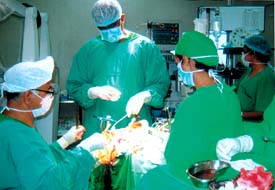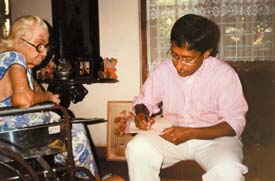|
DAILY NEWS ONLINE |
|
|
|
OTHER EDITIONS |
|
|
|
|
|
|
|
|
|
OTHER LINKS |
|
|
|
|
|
|
 |
|
|
 Heart operation in progress. |
The most senior cardiologist in the country Dr. D.P. Atukorale writing to the Health Watch on the present viral myocarditis, that is spreading fast in the Badulla district causing serious concern to the health authorities here, and even internationally to the extent of the World Health Organisation WHO, to send a team of doctors to investigate it, says that in his career of 35 years in cardiology upto now including the period he headed the Cardiology Unit in the Colombo National Hospital, he had seen about 20 patients with this cardiac condition Viral myocarditis, one of them had been a Judicial Officer who succumbed to the illness at the Cardiology Unit.
Dr. Atukorale writes: "As early as 1806, relationship between infection and chronic heart disease was postulated but it was only in 1970 with the advent of endomyocardial biopsies that diagnosis of this cardiac condition was established.
How this comes about
Many reasons have been attributed for developing this condition, the most common being of viral in origin.
Viral Myocarditis
Myocarditis (myo=muscle; card=heart; it is = inflammation) or heart muscle inflammation, is usually caused by viral infections that attack the heart. Myocarditis is a rare disease.
World Health Organisation (WHO) reports that incidence of cardio-vascular involvement after enteroviral infection is 1-4% depending on causal organism and incidence varies greatly among countries.
Myocarditis is characterised by enlargement of the heart and poor function (i.e. heart contracts badly) leading to heart failure. In some affected persons sudden death occurs and myocarditis causes death in 30-70% of children depending on their age (worst in young children less than one year of age).
In others, heart transplantation is needed. In the remainder of children improvement or normalisation is seen.
Causes, incidence and risk factors
Myocarditis as mentioned earlier is an uncommon disorder caused by viral infection such as coxsackie virus (type A and B) especially coxsackie B3h adenovirus type 2 and 3, echovirus, cytomeglovirus, Epstein - Barr virus, Herpes virus, Human immuno-deficiency virus, influenza and para-influenza virus, measles, mumps and varicella virus.
Myocarditis may be caused by exposure to chemicals or allergic reactions to certain medications and it can be associated with auto-immune diseases.
Coxsackie virus infection
Coxsackie refers to a collection of closely related viruses classified among the enteroviruses namely those that cause infection after being taken in orally with contaminated food or water and then multiply in the intestine (entero-intestinal).
Coxsackie viruses are divided into two major subgroups labelled A and B. There are 23 known coxsackie A viruses that usually cause only enteric diseases and 6 known coxsackie B viruses.
Coxsackie B 3 has been found to be one of the main causes of certain debilitating or life-threatening diseases such as viral myocarditis.
In viral myocarditis heart muscle becomes inflamed and weakened and causing symptoms of heart failure which may mimic a heart attack.
Symptoms of viral myocarditis
These include (a) history of preceding viral illness (b) fever, (c) chest pain that may resemble a heart attack, (d) joint pain or swelling, (e) abnormal heart beats (f) fatigue (g) dyspnoea (shortness of breath), (h) leg oedema (i) orthopnoea (J) irritability (k) lethargy (L) anorexia (loss of appetite) (m) periodic episodes of pallour and (n) lack of energy and general malaise. Absence of symptoms is common.
Additional symptoms that may be associated with acute myocarditis are (a) syncope (fainting), (b) decreased urine output and (c) other symptoms consistent with viral infection such as headache, muscle aches, diarrhoea, sorethroat and rashes.
Signs of viral myocarditis
A physical examination may detect weak pulse, cool extremities, pale and mottled skin, tachycardia (rapid heart beat), abnormal heart sounds (murmurs, extra heart sounds; Heart sounds (murmurs, extra heart sounds; heart sounds may be muffled especially in the presence of pericarditis.)
In myocarditis the patient may get fluid in the lungs and fluid in the skin of legs. In addition, other signs suggestive of an infection such as fever, rashes, red throat, itchy eyes and swollen joints may be present.
Hepatomegaly (enlargement of the liver) may be present in younger children. Neonates may seem irritable or may have respiratory distress and somnolence or hypothermia, oliguria (reduction in urine output) elevated liver enzymes, elevated blood urea and elevated serum creatinine.
In case of infants, myocarditis amy lead to failure to thrive, anorexia (loss of appetite), tachypnoea (rapid respiration), tachycardia (rapid heart beat) wheezing and diaphoresis with feeding.
In severe cases of myocarditis; low cardiac output may progress to acidosis and death.
Tests used the diagnosis of myocarditis
These include (a) electrocardiogram (b) chest x-ray, (c) ultrasound of the heart (echocardiogram) which may show weak heart muscle, enlargement of heart of fluid surrounding the heart. (d) white cell count (e) red cell count (f) blood cultures (g) blood tests for antibodies against heart muscle and body itself and (h) heart muscle biopsy (rarely performed).
Treatment
Treatment of myocarditis includes evaluation of underlying cause. This requires use of antibiotics, reduced level of activity and low salt diet. Steroids and other medications may be used to reduce inflammation. Diuretics (medicine to promote removal of body water via urine) are also given.
Q10 and Taurine are used in the treatment of myocarditis. If the heart muscle is weak, standard medicines to treat heart failure are also used.
Abnormal heart rhythm may require the use of additional medications, a pacemaker or even defibrillation. If a blood clot is present in any of the heart chambers, blood thinning medications such as warfarin sodium are given.
Prognosis (Expectations)
Prognosis depends on the cause and the individual patient. Some may resolve completely while others may have permanent heart failure (dilated cardiomyopathy).
Many researchers believe that dilated cardiomyopathy is a direct result of a previously burnt result of a previously burnt out.
As mentioned earlier, in most of the cases of viral myocarditis patients, the disease is resolved spontaneously without any treatment. In 20 per cent, there can be progressive disease or recurrence of symptoms.
The heart damage can be extensive causing arrhythmia (rhythm disturbances), weakened left ventricular function and in worst cases heart failure requiring heart transplantation. In these severe cases, cardiac disease progression persists after the virus is long one and the immune system continues to damage the heart.
Oxford recognition for Colvin Goonaratna centenarian study:
Fifty per cent of our centenarians are Dementia free
Oxford University has recognised Daily News medical page - HealthWatch collaborated Prof. Colvin Gooneratne Centenarian Study in Sri Lanka which began in 2001.
|
|
Following this, the Oxford University's Department of Pharmacology last year chose Sri Lanka to begin one of its studies on the extent to which Dementia and Alzheimer's disease are affecting the centenarian population in the world.
The study in collaboration with the Kelaniya University was done on randomly selected 20 centenarians who were in the Colvin Goonaratna study, thus crediting the Daily News (HealthWatch) collaborated study as the first of its kind in the world.
The Oxford/Kelaniya University study group in their report state that 50 per cent of the centenarians studied had no evidence of Dementia and about 25 per cent had no evidence of Alzheimer's disease.
The report states: "The average age of the study population was 102.1 comprising of 11 men and 9 women. 16 lived with their families and 4 in care homes."
"Ten out of 20 had Dementia and Alzheimers disease accounted for 72.2%."
The Oxford University study is headed by Prof. A. D. Smith, Director, OPTMA and Professor of Pharmacology. The Sri Lanka collaborators in the study were Dr. Asitha de Silva (Senior Lecturer and Head Department of Pharmacology Kelaniya University), Prof. S. B. Gunatilleke (Consultant Neurologist and Head Department of Medicine, Kelaniya University and Prof. Colvin Goonaratna (Emeritus Professor of Psychology Colombo University and Head Centenarian Study).
|
|
 |







